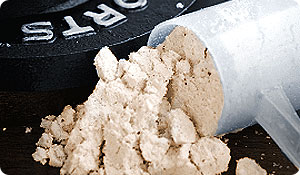
Protein is the power player in athletic nutrition. Bodybuilders, professional athletes and those looking to streamline their physique all know, protein provides the building blocks for muscle. The more muscle you have, the faster your metabolism is, the stronger you are and the better your athletic performance will be. At least that's the goal. Personal trainers often make the hard sell that if you really want to get fit, you'd better use a protein supplement. But is all that protein really necessary, or is it a bunch of hype?
The American Dietetic Association says the average American diet contains enough protein for recreational or even competitive athletes. Six to seven daily ounces of lean meat, poultry or fish or the equivalent from eggs, beans, nuts or seeds, along with dairy foods and grain products, supply enough protein for most athletes. Weight lifters and athletes involved in endurance sports do need somewhat more protein. Where they get it is up for debate.
Protein powder is a dietary supplement and if used, should be part of a healthy diet. Protein from four basic sources (whey, eggs, soy or rice) is processed and concentrated into powder form to be sprinkled on cereal, whipped into smoothies or added to juice and other foods. They're generally considered a safe option for bumping up your protein intake without adding a lot of calories. People with medical conditions, specifically those affecting the kidney, should talk to their physician before using protein supplements.
The American Academy of Family Physicians wrote, "A study examining the protein requirements of experienced resistance-training athletes found that those consuming the recommended daily allowance for protein (0.8 g per kg daily) had a negative nitrogen balance. The protein intake required for a zero balance was 1.4 g per kg daily, with a recommended intake of 1.8 g per kg daily.
What's a nitrogen balance? Most of the body's nitrogen is incorporated into the protein we eat. Positive nitrogen balance means nitrogen intake (protein consumption) is greater than excretion (in urine and feces). This happens during muscle building and growth. Negative nitrogen balance, means more nitrogen is excreted than is consumed, for example, with muscle breakdown. A zero balance means you're consuming the right amount of nitrogen (protein) for the amount of muscle you're supporting.
The AAFP study supports the idea that inadequate protein intake does cause a negative nitrogen balance, which slows muscle growth and causes fatigue. Protein intakes in excess of the study's recommendations didn't provide additional gains in strength or mass.
Are protein powders necessary? No, but many athletes find they're an easy way to increase intake. They could probably get the same results by consuming more protein rich foods. On the other hand, when compared to the dangerous and illegal supplements used by some athletes, protein powder does no harm either.





